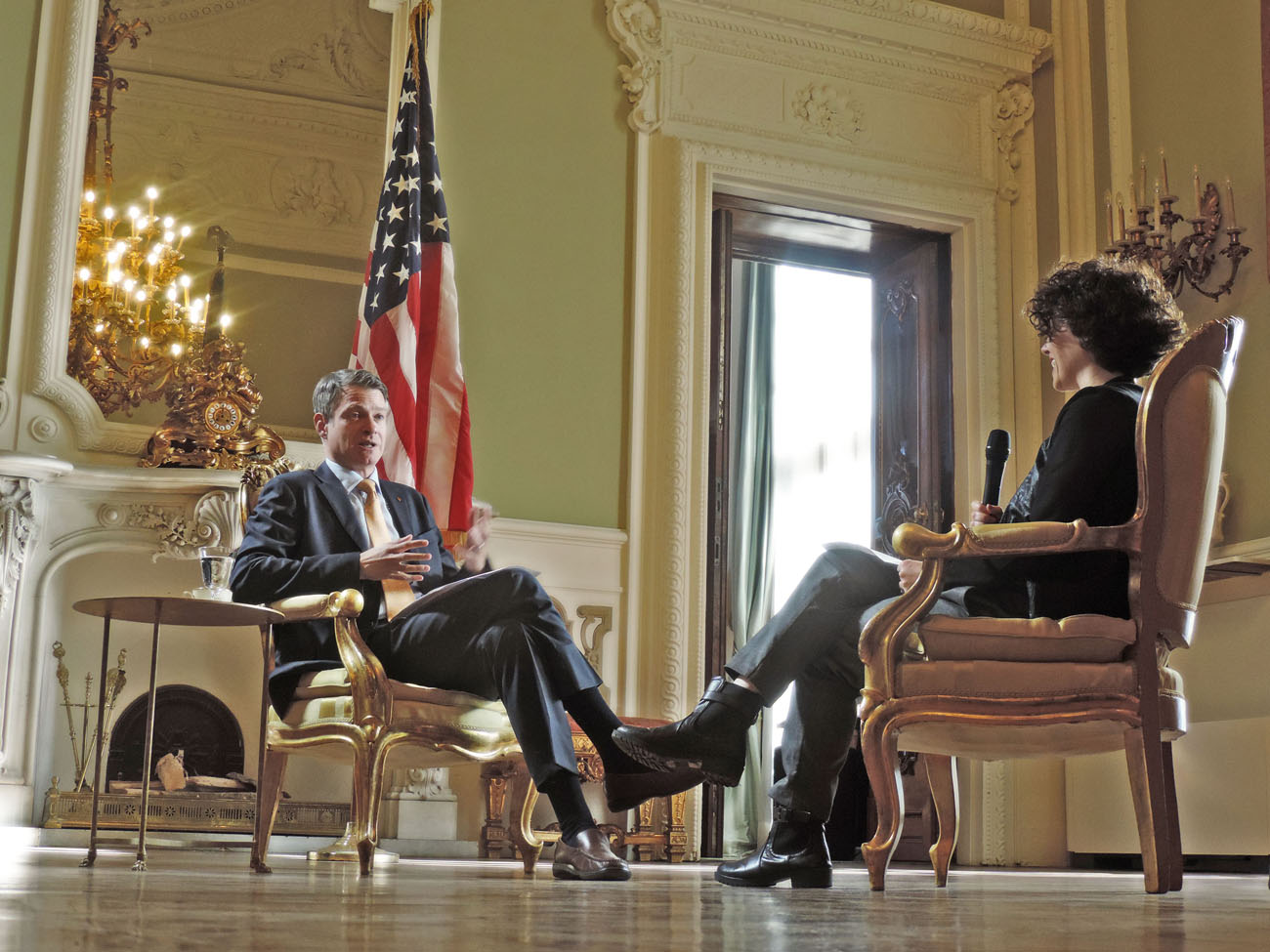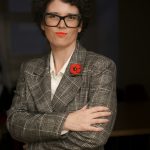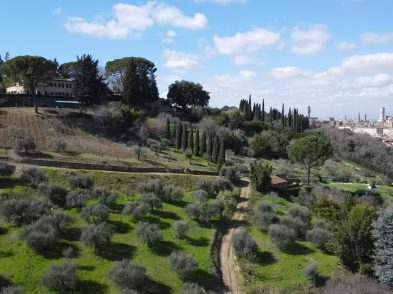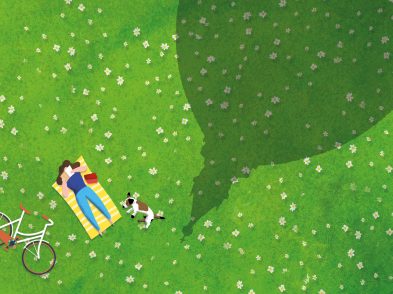Benjamin Wohlauer assumed office as the Consul General of the United States of America in Florence in July 2017. In this interview, which took place in the neo-Renaissance reception room of Palazzo Canevaro, Wohlauer clarified the Consulate’s greatest priority, explained the SelectUSA program and revealed his preferred aperitivo place when off duty.

Benjamin Wohlauer with TF editor-in-chief Helen Farrell | Ph. Leo Cardini
Helen Farrell: Congratulations on your appointment as the 44th Consul General of the United States in Florence. The first U.S. Consular Agent took up office here in Florence in 1819. In what ways do this history and heritage impact your approach to the consulship?
Benjamin Wohlauer: Florence is a wonderful place to be assigned and it’s a dream come true to have the chance to live and work here. But it’s a heavy responsibility because of that heritage. When you come into the building there’s a list of all of the consuls, representatives and consul generals that have been here for the last 198 years. When the first person arrived there was still the Granducato. Florence was the capital of Italy for five years, so we had our Embassy here then. My predecessors built a foundation upon which I want to continue their work and the ties with Tuscany and America that are so deep and broad here.
HF: Your wife Mary Ellen Countryman, now the U.S. Consul General in Naples, was the U.S. Consul General in Florence from 2008 to 2011. Does this appointment feel like a homecoming and does your wife advise you on the role?
BW: {laughing} Yes, she’s right there on the list. She’s got some advice; she’s been very helpful to me of course and has given me ideas of how to move here. And it does feel like a homecoming: this is the first time I’ve had a diplomatic assignment in a place where I’ve lived before, if not been assigned before, so it’s helpful to me to at least have some sense of what’s important to Tuscans, and also to people in Emilia Romagna and San Marino, which are in our district. I already have a love for the culture and the history. I have my favorite place for bistecca alla fiorentina. I worry about the vendemmia. So it gives me a bit of a head start in terms of feeling comfortable. I don’t have to go up that cultural learning curve that is so common in a new diplomatic assignment. I can get right to work.
HF: In your career to date, you have served overseas in Indonesia, Russia and Burma, as well as at the U.S. Consulate in Milan. In which ways do the challenges differ from country to country and assignment to assignment?
BW: It’s an excellent question. It’s the challenge and the pleasure of a diplomatic career because you’re always doing something different and you’re always in a new country. Milan and Florence are in the same country, but many would argue that they are completely different and have nothing in common with each other. Obviously the challenges and opportunities vary in line with the level of development of the country, the status of our bilateral relationship with Italy. We’re a long-time friend and ally, so it’s different than being in Burma 10 or 15 years ago when there was a military regime. But certain things remain the same from assignment to assignment. By and large, it’s all about the people-to-people ties. No matter what the official relationship is or the policy differences might be, there remains this strong desire to keep the connections and relationship alive. No matter where we are and what the official relationship is, there remains a fascination and interest in the United States. People are curious about our values, about life in the United States, they want to continue to travel and visit the country regardless of official policy or relations, and that always gives us something that we can work with as diplomats no matter where we are. When I travel around the world as a diplomat, I am proud to represent the United States abroad, and I’m proud to see the continued interest in the United States and what we stand for: that energizes me and keeps me going throughout my career.
HF: What advice would you give to somebody thinking that they might like to become a diplomat?
BW: It’s a fantastic career; it’s really a lifestyle. It’s one of those jobs that you don’t just do and then go home. I talk to a lot of American students here and always encourage them to think about a foreign service career because of the fact that they’re overseas at all, which for the United States is not a huge percentage of Americans. I encourage them to take the exam and apply because what you need is not necessarily an expertise in economics, political science or theories of international relations, instead it’s a curiosity and an excitement about living overseas, about experiencing foreign cultures, about finding ways to advance U.S. interests, but in a way that makes sense for the context in which you are working, so to have that cultural sensitivity and curiosity that a student demonstrates just by coming. To me, it makes him or her an excellent candidate—and that’s how I got into it: I was always interested in doing something overseas. I did a study abroad semester, in France in my case, and that confirmed my thought that living and working overseas would be a wonderful experience. You look at what the different options are and this is by far the best choice I could have made. I’m never jealous of any of my friends when I hear about what they’re doing. No matter how cool their jobs or careers are, I wouldn’t trade with anybody.
HF: I recently spoke with Mayor Dario Nardella about what the Comune is doing to promote a culture of safety and cultural integration among American students in Florence following the recent rape accusations of two American students by on-duty Carabinieri officers. What is the U.S. Consulate in Florence doing on this front and can you explain the Consulate’s involvement in the case?
BW: There’s absolutely no greater priority for the Consulate—there never has been and there never will be a greater priority than the safety and security of American citizens in the district. That goes for tourists, students and residents, for our American investors here, for our American military that are stationed out in Camp Darby… It’s why we’re here and we dedicate ourselves to that in many ways all year round, not just when there’s some kind of crisis. More specifically with students, we visit with them as a matter of course at the beginning of the different semesters and talk to them generally about safety and security issues. We have always had wonderful support from the various comuni—because the students aren’t just in Florence, they’re all over—and law enforcement authorities. That cooperation will continue to flourish into the future. Florence, Tuscany and Emilia Romagna are extremely safe places, so we start from a very high level. There’s always more that can be done to collaborate and we’ll always find creative ways and tangible ways to continue to work together.
But one thing I’d like to focus on moving forward is the question of integration and the students and other elements of the American community here being more involved in the local community, although they are already extraordinarily involved with the community in all sorts of different ways: college students teach English in high schools and help to clean graffiti off buildings, and American investors give their employees time off every year to do projects with Caritas or other Italian civil society organizations. What I’d like to see is that these existing community service projects be better recognized and highlighted. That’s a task for us to work on, along with you in the media. It’s the top of our list in terms of priorities in working with students and other elements of the American community to improve their experience here in Italy.

Ph. Leo Cardini | Watch the interview in video format here
HF: I couldn’t agree more. It’s something we see at The Florentine. We have a lot of American study abroad students who do internships with us and I’ve always been very impressed by the level of their skills, commitment and enterprise so that’s something we can collaborate on, with the support of the Comune, getting the word out there and involving these students in various initiatives and internship programs that actually bring a real life aspect to their study abroad experience.
BW: I think that’s wonderful, and thanks to The Florentine for offering those opportunities. We’d love to do more with you and with anyone else who’s interested in working with students, but not only. We have tens of thousands of American residents here, major corporations and smaller U.S. companies. One of the real strengths of American culture, especially amongst young people, is this spirit of volunteerism: it’s something that they bring to the table. When I’m meeting with Italian authorities and Italians in general, I encourage them to think of Americans here not just as visitors or as a source of revenue for their business but as members of the community, as members of the fabric of society—neighbors, friends, employers, employees and clients—and treat them as they would their Italian members of the community, and try to get from them that something extra that they bring.
HF: You recently commented that, while Tuscan exports to the U.S. remain strong, you would like to see more importation of U.S. products in Tuscany. How can this trading be encouraged? And how does the SelectUSA program work for Tuscan countries interested in investing in the U.S.?
BW: One of our priorities for a long time in every country in the world has been to promote U.S. exports. One of the fundamental functions of an embassy abroad is to work with American companies who are selling and with local companies who want to buy. So there’s quite a lot that we do just as a matter of course. The Foreign Commercial Service, which is located in our Embassy, has a large office, part of the U.S. Department of Commerce, and they’re the lead on this nationwide. Trade shows are one of the things that they do and that the consulates do, including our Consulate. There are very large trade shows in Bologna in particular, but elsewhere they’ll bring delegations of American exporters and try to link they up with Italian buyers, so that’s one way. We’ll try to bring delegations of Italian distributors or companies here that are interested in high-quality or high-tech U.S. products where we have a comparative advantage, bring them to the States to see what the U.S. sellers have on offer and try to broker some of those deals.
In terms of SelectUSA, this is an initiative that the Department of Commerce is heading up, but that we’re going to be increasingly active on here in Florence. We try to find new Italian companies that haven’t yet invested in the U.S. market but might be interested to do so. We also talk to Italian companies that have successfully invested in the U.S., and we encourage them to look for additional opportunities in the U.S. It’s a bit complicated because we have no federal investment policy.
Every state in the United States is responsible for promoting investments in their own way, but what we can do is help in those initial meetings to give some basic information and then to link up the potential investors here with state authorities in the United States in order to make the deals. We’ll do some meetings initially through the American Chamber of Commerce here in Florence, work with Confindustria elsewhere, and try to get some interest going. There will be some SelectUSA events early next year to give some more detailed information. Then every year in June there’s a big meeting in Washington, where we bring potential investors from all over the world to meet with representatives of the various states, so that they can really get down to business and figure out the details of the investment. As we have seen in many of the President’s statements, one of the highest priorities of this administration is to encourage more inward investment into the United States. We’re in a great position to do that because there is such a strong bilateral relationship between Tuscany, Emilia Romagna and San Marino and the United States. Our business people and the business people there know each other really well, they know the territory well, so it’s just a question for us to facilitate as best we can. It’s exciting and I’m looking forward to doing more on that.
HF: What are your goals as Consul General in Florence?
BW: It’s hard to choose as there’s so much we can do. 198 years of incredible work by my predecessors has left an amazing menu of opportunities. What’s important is for us to work on three things in particular. Two of them we’ve discussed already, our top priority of course is, and always is, to do more to get Americans of all stripes here better integrated, feeling more secure and safe in this community and in this region, as well as in Emilia Romagna and San Marino—10 per cent of sammarinesi are dual American citizens so we have a lot of interests there. Attached to that is the campaign to get Americans more involved in community service and highlight better what’s already going on. The second priority is redoubling our existing efforts to get more Emilia Romagna, Tuscan and Sammarinese companies to invest in the U.S., and we’ll be doing a number of outreach programs in the next few months. The third is kind of a more fun, longer-term objective, which is to take stock of what we’ve done together in 198 years. We want to work with archives, universities and various cities around the consular district so that we can put together a program during 2019 to celebrate our 200 years together. So stay tuned for that!
One last thing: we’ve just started a Twitter feed and we’re trying to expand our Facebook presence, so a lot of what we’re talking about we’re going to be putting out through our social media platforms: @uscgflorence. We have our traditional methods as well like email, but we are encouraging Americans to make sure they follow us, so that we can get any emergency messages out to them as quickly as possible.
Florence Quickfire Questions
Favourite place for an aperitivo in Florence?
I’ve been going to Santarosa Bistro quite a bit. The area is spectacular, the drinks are great and I love the tapas menu there. It’s a great spot.
One place in Florence that makes you happy or inspires you.
It’s kind of a strange choice, but starting when I used to come down here before to see my wife, I always loved the walk on the costa San Giorgio up to Porta San Giorgio, where you feel like you could be in Florence 300-400 years ago.
The biggest difference between Italians and Americans?
Being a diplomat, I preface this by saying that of all the places that I’ve been Italy is where we have the most in common. I think it’s because of our shared history. So many Italians have come to the United States; so many Americans in the past 150 years have come here. Once Americans decide to travel outside of the U.S. they want to come to Italy, so we have so much in common, our values, our history. But one thing I’ve noticed that we do have a little bit different, and this is not just Italy, is a difference in a sense of time. I think it’s a historical perspective. Americans are very much in the moment, reporting quarterly results from companies, looking at what we can achieve right away and “Let’s not spend time to lay the groundwork. Let’s just get in there and fix this problem,” whereas Italians (and not only) have a different perspective probably because they have been working on this for three, four, five, six hundred years, so the sense of perspective is a little bit different. The American desire to jump in there and fix the problem is often a positive, sometimes a negative. The Italian idea to take some time and “Let’s see how it evolves” or “We can’t fix this because…” sometimes it’s good, sometimes it’s less positive.
Best day trip in Tuscany?
You could spend all day listing the best day trips. I’ve loved taking wonderful day treks up to Montesenario and Madonna del Sasso, up from the Olmo area. Actually I shouldn’t advertise it because it’s so nice and quiet now, but it’s a spectacular thing to do on a beautiful day.
Favourite Florentine, past and present?
Historically, Amerigo Vespucci. If we think about our 200 years here, we have to go back even further to give thanks to Amerigo Vespucci for putting us on the map {laughs}, and also because he’s here with us in borgo Ognissanti, so he’s very close by. Modern Florentine: Salvatore Ferragamo has such a great Italo-American story, thinking about what Italians and Americans have in common. Those that left here and went to the States and brought back the best of the U.S. to plant here and use the best of Italy and the U.S. together, it’s like out of a book. I love those types of stories when we uncover them.
Strangest thing you’ve seen in the city?
It’s not strange, but the most remarkable thing I have seen is the Scoppio del Carro because that is really something to see in a modern city.









